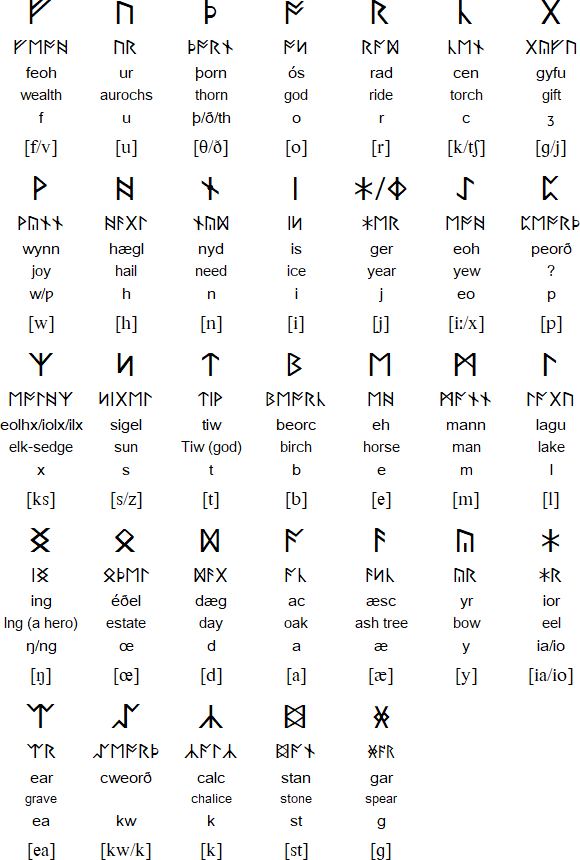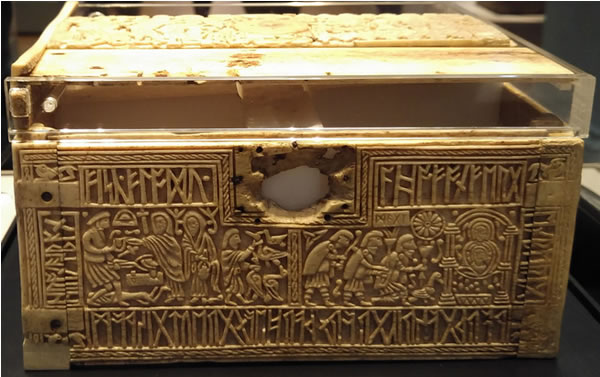Anglo-Saxon runes are an extended version of Elder Futhark consisting of between 26 and 33 letters. It is thought that they were used to write Old English / Anglo-Saxon and Old Frisian from about the 5th century AD. They were used in England until the 10th or 11th centuries, though after the 9th century they were mainly used in manuscripts and were of interest to antiquarians, and their use ceased after the Norman conquest in 1066.
It is possibly that this alphabet was developed in Frisia and then adopted in England, or that it developed in England and then spread to Frisia.
From the 7th century the Latin alphabet began to replace these runes, though some runes continued to appear in Latin texts representing whole words, and the Latin alphabet was extended with the runic letters þorn and wynn.

Notes and corrections provided by Nothelm Hurlebatte
Download an chart of Anglo-Saxon runes (Excel speadsheet)

fisc flodu ahof on fergenberig
warþ gasric grorn þær he on greut giswom
hronæs ban
The fish beat up the sea(s) on to the mountainous cliff
The king of (?)terror became sad when he swam onto the grit.
Whale's bone
The inscription is a riddle with the answer whale's bone, which is what the casket is made of.
From the Franks Casket. Photo by Simon Ager, taken in the British Museum.


Eall folc weorþaþ frēo and efne bē āre and rihtum ġeboren. Ġerād and inġehyġd sind heom ġifeþu, and hīe þurfon tō ōþrum ōn fēore brōþorsċipes dōn.
All human beings are born free and equal in dignity and rights. They are endowed with reason and conscience and should act towards one another in a spirit of brotherhood.
(Article 1 of the Universal Declaration of Human Rights)
Information about Angli-Saxon Runes
http://en.wikipedia.org/wiki/Futhorc
Convert English in the Latin alphabet to Anglo-Saxon Runes
http://futhorc.com/runic.asp
Anglo-Saxon Runic fonts
http://www.babelstone.co.uk/Fonts/AngloSaxon.html
Elder Futhark, Younger Futhork, Medieval (Latinised) Futhark, Dalecarlian Runes, Anglo-Saxon Runes
A-chik Tokbirim, Adinkra, ADLaM, Armenian, Avestan, Avoiuli, Bactrian, Bassa (Vah), Beitha Kukju, Beria (Zaghawa), Borama / Gadabuursi, Carian, Carpathian Basin Rovas, Chinuk pipa, Chisoi, Coorgi-Cox, Coptic, Cyrillic, Dalecarlian runes, Elbasan, Etruscan, Faliscan, Fox, Galik, Georgian (Asomtavruli), Georgian (Nuskhuri), Georgian (Mkhedruli), Glagolitic, Global Alphabet, Gothic, Greek, Hurûf-ı munfasıla, Irish (Uncial), Kaddare, Kayah Li, Khatt-i-Badí’, Khazarian Rovas, Koch, Korean, Latin, Lepontic, Luo Lakeside Script, Lycian, Lydian, Manchu, Mandaic, Mandombe, Marsiliana, Medefaidrin, Messapic, Mongolian, Mro, Mundari Bani, Nag Chiki, Naasioi Otomaung, N'Ko, North Picene, Novo Tupi, Nyiakeng Puachue Hmong, Odùduwà, Ogham, Old Church Slavonic, Oirat Clear Script, Ol Chiki (Ol Cemet' / Santali), Old Italic, Old Nubian, Old Permic, Ol Onal, Orkhon, Osage, Oscan, Osmanya (Somali), Pau Cin Hau, Phrygian, Pollard script, Runic, Székely-Hungarian Rovás (Hungarian Runes), South Picene, Sutton SignWriting, Sunuwar, Tai Viet, Tangsa, Todhri, Toto, Umbrian, (Old) Uyghur, Wancho, Yezidi, Zoulai
Page last modified: 15.03.23
[top]
You can support this site by Buying Me A Coffee, and if you like what you see on this page, you can use the buttons below to share it with people you know.

If you like this site and find it useful, you can support it by making a donation via PayPal or Patreon, or by contributing in other ways. Omniglot is how I make my living.
Note: all links on this site to Amazon.com, Amazon.co.uk
and Amazon.fr
are affiliate links. This means I earn a commission if you click on any of them and buy something. So by clicking on these links you can help to support this site.
[top]